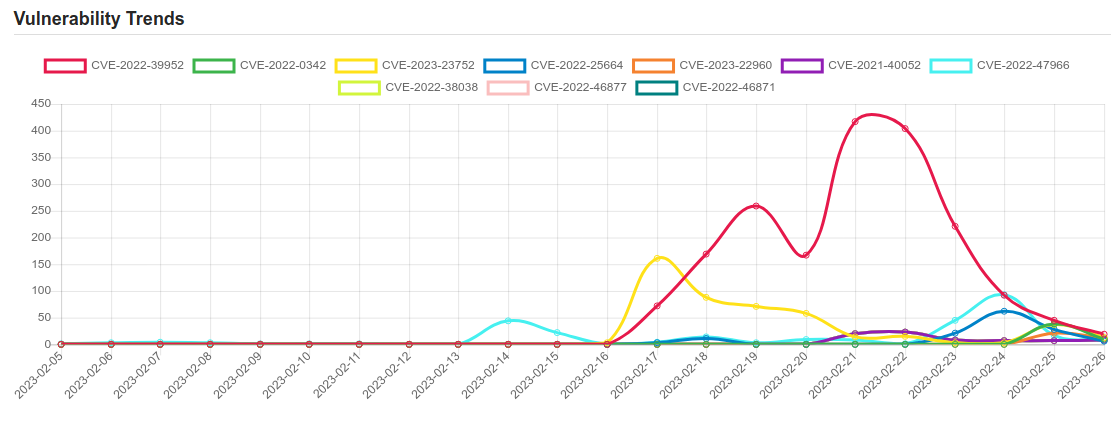Daily Vulnerability Trends: Mon Feb 27 2023

| CVE NAME | CVE Description |
| CVE-2022-46877 | By confusing the browser, the fullscreen notification could have been delayed or suppressed, resulting in potential user confusion or spoofing attacks. This vulnerability affects Firefox < 108. |
| CVE-2022-46871 | An out of date library (libusrsctp) contained vulnerabilities that could potentially be exploited. This vulnerability affects Firefox < 108. |
| CVE-2022-0544 | An integer underflow in the DDS loader of Blender leads to an out-of-bounds read, possibly allowing an attacker to read sensitive data using a crafted DDS image file. This flaw affects Blender versions prior to 2.83.19, 2.93.8 and 3.1. |
| CVE-2020-28362 | Go before 1.14.12 and 1.15.x before 1.15.4 allows Denial of Service. |
| CVE-2022-25845 | The package com.alibaba:fastjson before 1.2.83 are vulnerable to Deserialization of Untrusted Data by bypassing the default autoType shutdown restrictions, which is possible under certain conditions. Exploiting this vulnerability allows attacking remote servers. Workaround: If upgrading is not possible, you can enable [safeMode](https://github.com/alibaba/fastjson/wiki/fastjson_safemode). |
| CVE-2023-25136 | OpenSSH server (sshd) 9.1 introduced a double-free vulnerability during options.kex_algorithms handling. This is fixed in OpenSSH 9.2. The double free can be leveraged, by an unauthenticated remote attacker in the default configuration, to jump to any location in the sshd address space. One third-party report states “remote code execution is theoretically possible.” |
| CVE-2023-21608 | Adobe Acrobat Reader versions 22.003.20282 (and earlier), 22.003.20281 (and earlier) and 20.005.30418 (and earlier) are affected by a Use After Free vulnerability that could result in arbitrary code execution in the context of the current user. Exploitation of this issue requires user interaction in that a victim must open a malicious file. |
| CVE-2023-21746 | Windows NTLM Elevation of Privilege Vulnerability. |
| CVE-2023-20858 | VMware Carbon Black App Control 8.7.x prior to 8.7.8, 8.8.x prior to 8.8.6, and 8.9.x.prior to 8.9.4 contain an injection vulnerability. A malicious actor with privileged access to the App Control administration console may be able to use specially crafted input allowing access to the underlying server operating system. |
| CVE-2023-0669 | Fortra (formerly, HelpSystems) GoAnywhere MFT suffers from a pre-authentication command injection vulnerability in the License Response Servlet due to deserializing an arbitrary attacker-controlled object. This issue was patched in version 7.1.2. |
| CVE-2023-26545 | In the Linux kernel before 6.1.13, there is a double free in net/mpls/af_mpls.c upon an allocation failure (for registering the sysctl table under a new location) during the renaming of a device. |
| CVE-2023-21839 | Vulnerability in the Oracle WebLogic Server product of Oracle Fusion Middleware (component: Core). Supported versions that are affected are 12.2.1.3.0, 12.2.1.4.0 and 14.1.1.0.0. Easily exploitable vulnerability allows unauthenticated attacker with network access via T3, IIOP to compromise Oracle WebLogic Server. Successful attacks of this vulnerability can result in unauthorized access to critical data or complete access to all Oracle WebLogic Server accessible data. CVSS 3.1 Base Score 7.5 (Confidentiality impacts). CVSS Vector: (CVSS:3.1/AV:N/AC:L/PR:N/UI:N/S:U/C:H/I:N/A:N). |
| CVE-2022-39952 | A external control of file name or path in Fortinet FortiNAC versions 9.4.0, 9.2.0 through 9.2.5, 9.1.0 through 9.1.7, 8.8.0 through 8.8.11, 8.7.0 through 8.7.6, 8.6.0 through 8.6.5, 8.5.0 through 8.5.4, 8.3.7 may allow an unauthenticated attacker to execute unauthorized code or commands via specifically crafted HTTP request. |
| CVE-2022-0342 | An authentication bypass vulnerability in the CGI program of Zyxel USG/ZyWALL series firmware versions 4.20 through 4.70, USG FLEX series firmware versions 4.50 through 5.20, ATP series firmware versions 4.32 through 5.20, VPN series firmware versions 4.30 through 5.20, and NSG series firmware versions V1.20 through V1.33 Patch 4, which could allow an attacker to bypass the web authentication and obtain administrative access of the device. |
| CVE-2023-23752 | An issue was discovered in Joomla! 4.0.0 through 4.2.7. An improper access check allows unauthorized access to webservice endpoints. |
A considerable amount of time and effort goes into maintaining this website, creating backend automation and creating new features and content for you to make actionable intelligence decisions. Everyone that supports the site helps enable new functionality.
If you like the site, please support us on Patreon using the button below

To keep up to date follow us on the below channels.





![Cobalt Strike Beacon Detected - 154[.]204[.]35[.]215:80 7 Cobalt-Strike](https://www.redpacketsecurity.com/wp-content/uploads/2021/11/Cobalt-Strike-300x201.jpg)